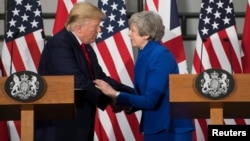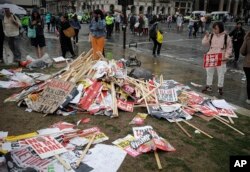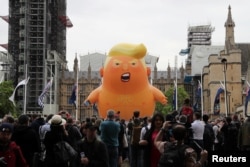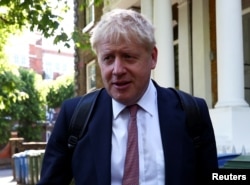Roderick James contributed to this report.
LONDON — President Donald Trump deployed a mix of diplomacy and barbs in his joint news conference with British Prime Minister Teresa May in London Tuesday.
Trump said the U.S. is committed to a "phenomenal trade deal" with Britain as the country prepares to leave the European Union.
"There is tremendous potential in that trade deal, probably two and even three times of what we're doing right now," Trump said.
Trump said he saw "no limitations" on future intelligence-sharing, despite disagreements over the threat posed by Chinese tech giant Huawei.
"We have an incredible intelligence relationship, and we will be able to work out any differences," Trump said.
He also praised May, who is stepping down as Conservative Party leader on Friday, saying she has "done a very good job."
But Trump described opposition Labor leader Jeremy Corbyn, who has been critical of Trump, as a "negative force," and said he would not meet with him during his visit. Trump also renewed his criticism of London Mayor Sadiq Khan, who wrote in The Observer newspaper that welcoming Trump for a state visit was "un-British.
Chances of trade deal slim
May said she supported a bilateral trade deal. She praised the economic and trade relations between the countries as one that "helps to ensure there are jobs that employ people here in the U.K. and in the United States, that underpins our prosperity, and our future."
But analyst Jacob Parakilas of Chatham House said the chances of achieving that trade deal anytime soon is slim.
He said with Brexit still uncertain, there was a pretty limited chance of anything substantive emerging, as well as "the inability to determine what a future U.S.-U.K. trade relationship will look like" without the resolution to the question of whether the U.K. will remain in the customs union or the single market with the European Union.
Where are the protests?'
While Trump and May held their joint press conference, protesters flooded the streets a block away.
They had various messages for the U.S. leader, including protesting his policies on the environment and climate change.
They also protested what they see as Trump's attacks on values they uphold.
"Values like respect for other people, tolerance, nondiscrimination," said Londoner Christine Fuchs. "Now, our government turns around and hosts someone with full stage honors, who stands against all those values."
Women groups, some wearing red outfits similar to those in the hit TV series "The Handmaid's Tale," also protested what they view as the administration's attacks on reproductive rights.
Though they focused on different causes, they were united in their rejection.
"My biggest problem with Trump is just the hate within him, and the fact that he can bring that hatred out in other people," said Ethan Holden of Bournemouth.
Trump dismissed the protests as "fake news" and said he felt only "tremendous love" from the British people."And even coming over today, there were thousands of people cheering," he said. "Where are the protests? I don't see any protests."
There appeared to be fewer protesters compared to the more than 100,000 who protested Trump on his visit here last year. Organizers point to the fact that it's the middle of the work week, and blamed the weather, which drizzled for much of the day.
Support for Johnson, meeting with Farage
Trump, who has publicly backed former Foreign Minister Boris Johnson to replace Prime Minister May, predicted an agreement for Britain to leave the EU "will happen and that it should happen." He said he thought Brexit was going to happen "because of immigration, more than anything else."
Further wading into Britain's divorce from the EU, Trump met with Brexit Party leader Nigel Farage,a strong critic of May, at the U.S. ambassador's residence.
On Wednesday, Trump will continue his trip with D-Day commemoration ceremonies in both Britain and France, with a stop in Ireland.











